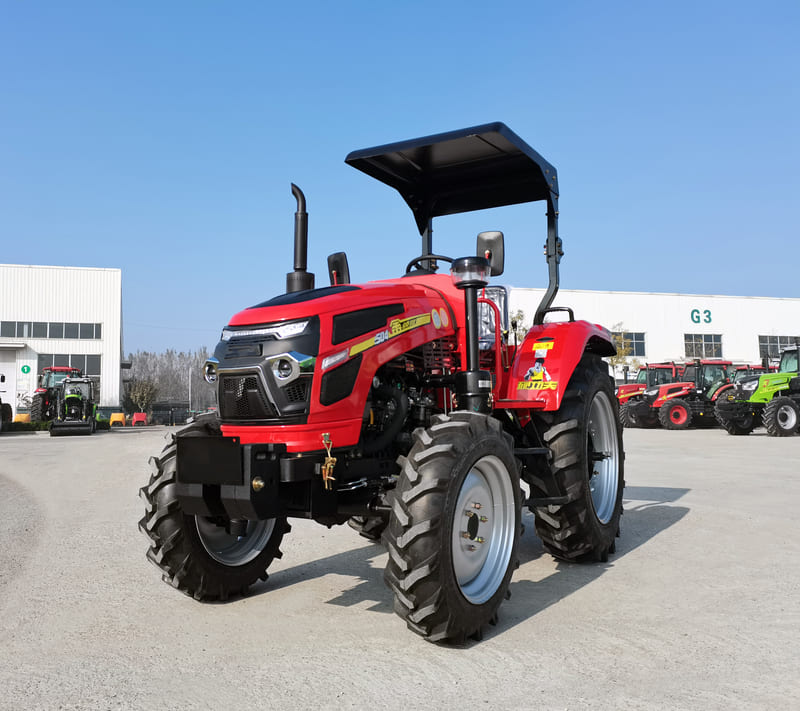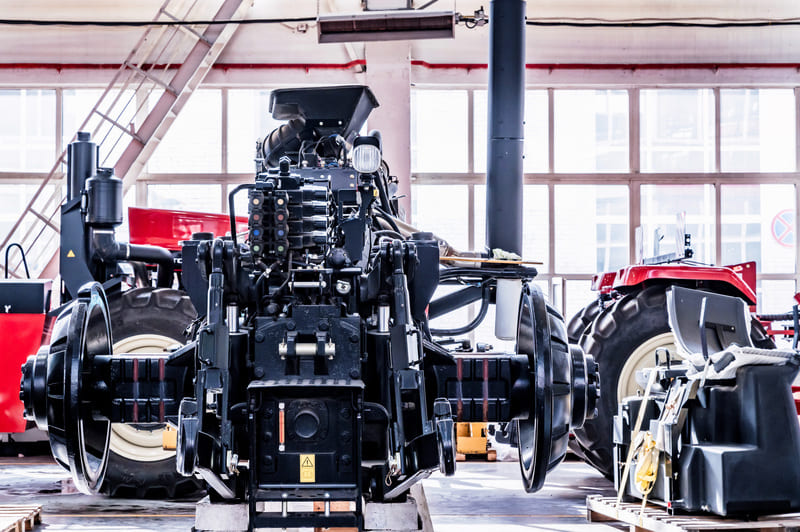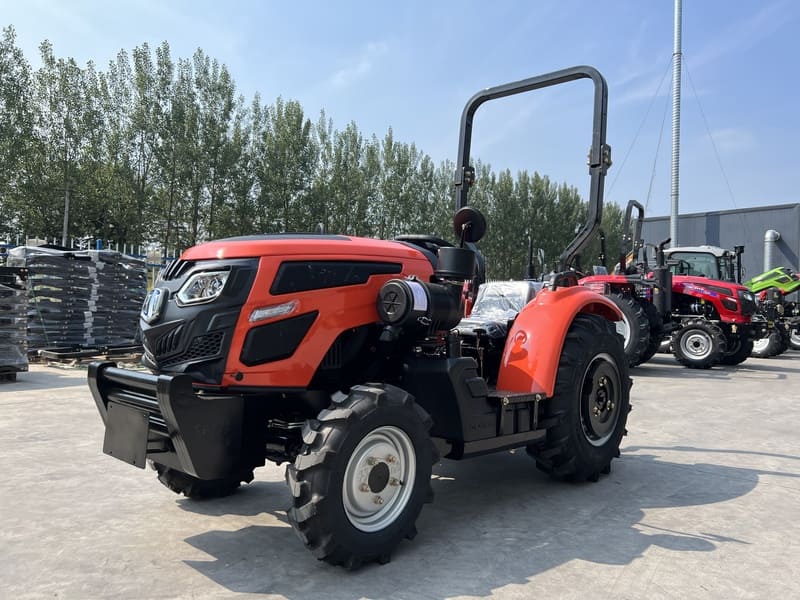Ever wondered why diesel engines are the go-to for farm tractors? It’s all about the power, efficiency, and durability they bring to the fields.
Diesel engines are favored in farm tractors due to their superior torque, fuel efficiency, and longevity compared to gasoline engines. These attributes make them perfect for the rigorous demands of agricultural work.
Growing up on a farm, I quickly learned that not all engines are created equal. Diesel engines have a knack for handling those tough, long days when tractors pull hefty loads or navigate muddy fields. I remember countless mornings when our diesel-powered tractor roared to life, ready to tackle whatever the day threw at us. They offer consistent power, which is crucial when you’re dealing with back-to-back tasks like plowing and harvesting. Plus, their impressive fuel efficiency means fewer stops for refueling, saving both time and money—a real boon for any farmer trying to make the most of each day.
Diesel engines provide higher torque than gasoline engines.True
Diesel engines are designed to produce more torque, essential for heavy-duty tasks.
Gasoline engines are more fuel-efficient than diesel in tractors.False
Diesel engines are generally more fuel-efficient, making them ideal for tractors.
Why Are Diesel Engines More Fuel Efficient Than Gasoline Engines?
I remember the first time I discovered the magic of diesel engines. It was during a road trip, and the fuel gauge just didn’t seem to budge. Curious why this was, I delved into the world of diesel.
Diesel engines outshine gasoline engines in fuel efficiency due to their higher compression ratios, denser energy content in diesel fuel, and a highly efficient combustion process.

Higher Compression Ratios
I’ve always been fascinated by how things work, and learning about diesel engines was no exception. Diesel engines boast a higher compression ratio than gasoline engines, ranging from 14:1 to 25:1. This means they compress air much more tightly before fuel is added, enhancing thermal efficiency1. Picture it like squeezing a spring tighter to get a bigger bounce. Gasoline engines, by contrast, have lower compression ratios of 8:1 to 12:1, which means less energy extraction from the fuel.
| Engine Type | Typical Compression Ratio |
|---|---|
| Diesel Engine | 14:1 to 25:1 |
| Gasoline Engine | 8:1 to 12:1 |
Greater Energy Density
Ever felt the heft of diesel fuel compared to gasoline? That’s because diesel packs more punch per liter—35.8 megajoules, to be exact, versus gasoline's 32.2 megajoules. This higher energy density allows diesel engines to travel further on the same amount of fuel, which is a dream come true for long-haul drivers like myself who dread frequent stops at gas stations.
Efficient Combustion Process
The secret sauce in diesel engines is their efficient combustion process. Thanks to a direct injection system, the fuel-air mix is just right for optimal burning. This precise control over combustion not only boosts efficiency but also reduces waste. I’ve noticed that when driving under heavy load, my diesel vehicle doesn’t just power through; it uses fuel more judiciously.
Advanced Turbocharging Techniques
Modern diesel engines often feature advanced turbocharging techniques that further improve performance and fuel economy2. By increasing air intake, turbochargers ensure more complete combustion of fuel. It’s like giving your engine a breath of fresh air—especially useful when speeding or hauling heavy loads.
Less Throttling Loss
Unlike gasoline engines, diesel engines face less throttling loss because they don’t use a throttle body in the same way. With fewer restrictions on air intake, these engines operate more efficiently. It’s akin to breathing freely versus through a straw—no contest.
All these factors together make diesel engines a compelling choice for anyone looking for long-term savings and efficiency. For me, understanding these benefits helped me make informed decisions about my vehicle purchases and appreciate the technology that goes into every mile.
Diesel engines have higher compression ratios than gasoline engines.True
Diesel engines compress air at 14:1 to 25:1, higher than gasoline's 8:1 to 12:1.
Gasoline engines produce more torque at lower RPMs than diesel engines.False
Diesel engines produce more torque at lower RPMs, enhancing efficiency under load.
How Do Diesel Engines Deliver Superior Torque for Farming Needs?
Remember those long days on the farm, where every machine's reliability was tested to its limits? Diesel engines often emerge as the unsung heroes, providing the relentless torque needed for farming's toughest tasks.
Diesel engines deliver superior torque for farming needs due to their high compression ratios, which allow for greater power output at lower RPMs. This makes them ideal for heavy-duty tasks like plowing and hauling.

Understanding Diesel Engine Torque
Torque is the rotational force that engines produce, crucial for tasks requiring power and endurance. I remember my first day driving a diesel-powered tractor; the difference was immediate. The sheer force it delivered at such low speeds was incredible. Diesel engines are designed with high compression ratios, creating a more robust combustion process and resulting in higher torque.
| Engine Type | Torque Characteristics |
|---|---|
| Diesel | High torque at low RPMs |
| Gasoline | Lower torque at higher RPMs |
Compression Ratios and Power Output
The compression ratio3 of a diesel engine is typically higher than that of a gasoline engine. I recall learning about this during a chat with an old mechanic at a county fair. He explained how this tighter compression leads to a powerful combustion stroke, producing greater torque—exactly what’s needed when pulling heavy machinery like plows and harvesters.
Fuel Efficiency and Longevity
Diesel engines aren't just about power; they're efficient too. They burn fuel more completely, offering better mileage—something crucial when operating farm machinery for long periods. Their durability means fewer breakdowns and a longer lifespan, making them cost-effective for farmers. I’ve seen tractors running smoothly after thousands of hours of use, testament to their robust build.
| Benefit | Diesel Engines |
|---|---|
| Fuel Efficiency | Higher |
| Engine Longevity | Greater |
Application in Agricultural Machinery
The design of diesel engines allows for sustained power delivery, critical for agricultural applications. Whether it's plowing through tough soil or hauling loads across fields, diesel engines provide the necessary torque. I remember watching a tractor equipped4 with a diesel engine consistently perform under heavy loads without needing high RPMs, reducing wear and improving fuel efficiency.
Environmental Considerations
In recent years, modern diesel engines have evolved to meet stringent environmental standards. Innovations like cleaner fuel types and advanced emission control systems have made them more environmentally friendly while still delivering superior performance. While diesel engines were once notorious for higher emissions, these advancements ensure they remain viable options in sustainable farming practices.
In summary, diesel engines' high torque output at low RPMs, combined with their fuel efficiency and durability, make them indispensable in farming. Their capacity to handle heavy-duty tasks efficiently supports farmers in maximizing productivity while managing costs effectively. The versatility and reliability of diesel technology continue to drive its preference in the agricultural sector. Ongoing improvements in environmental performance will further enhance their suitability for modern farming needs.
Diesel engines deliver high torque at low RPMs.True
Diesel engines are designed to provide high torque at lower RPMs, making them ideal for heavy-duty tasks.
Gasoline engines have higher torque than diesel engines.False
Gasoline engines generally produce lower torque compared to diesel engines, especially at low RPMs.
What Makes Diesel Engines More Durable Than Gasoline Engines?
Ever wondered why diesel engines are often the unsung heroes of heavy machinery?
Diesel engines outshine their gasoline counterparts in durability due to their sturdy construction, high compression ratios, and efficient combustion. These attributes not only boost their longevity but also make them ideal for demanding tasks.

I remember the first time I was introduced to the world of diesel engines. It was during a long summer spent on my grandfather's farm, where the rumbling sound of the tractor became a comforting backdrop to my days. Those tractors, powered by diesel engines, seemed indestructible as they plowed through fields day after day.
Construction and Materials
Diesel engines are built tough. They're like the reliable old boots that never let you down, crafted with stronger materials to handle the high compression ratios they operate under. This robust construction means less wear and tear over time. I’ve always admired how these engines, much like those trusty boots, seem ready to tackle any challenge thrown their way.
| Feature | Diesel Engines | Gasoline Engines |
|---|---|---|
| Compression Ratio | Higher | Lower |
| Cylinder Construction | Cast iron or aluminum alloys | Mostly aluminum |
| Piston Design | Heavier and sturdier | Lighter |
Efficient Combustion Process
Every time I think about diesel engines, I’m reminded of their efficient fuel use. It’s like watching a seasoned chef use every ingredient perfectly. Diesel’s higher temperatures and pressures mean better combustion efficiency, reducing strain on engine parts and enhancing performance.
- Fuel Injection: Diesel uses direct injection—think of it as a precision strike—allowing for meticulous control over combustion.
- Turbocharging: Many diesel engines come with turbochargers, boosting efficiency and performance—kind of like adding a shot of espresso to your morning routine.
Maintenance and Longevity
The simplicity of diesel engines is another reason they shine, requiring less frequent maintenance than gasoline engines. It’s a bit like finding a low-maintenance plant that thrives with minimal attention—perfect for someone like me who’s not exactly a green thumb.
- Service Intervals: Longer service intervals mean less downtime—one less thing to worry about in an already busy schedule.
- Oil Changes: Even though diesel engines use more oil, they typically need fewer changes due to better combustion efficiency5.
Performance Under Load
Diesel engines excel under pressure, just like that friend who thrives in high-stakes situations. They’re ideal for heavy-duty tasks like trucking and agriculture6, where consistent power delivery is crucial.
- Torque Output: Diesel engines produce significant torque at lower RPMs, essential for tasks requiring real pulling power.
- Steady Power Delivery: Their ability to maintain power consistency is invaluable for long-duration tasks, like harvest season on my grandfather's farm.
In summary, diesel engines are the workhorses of the machinery world—built strong, running efficiently, and performing under pressure. They remind me of those enduring tractors from my youth—reliable and ready for anything.
Diesel engines use heavier piston designs.True
Diesel engines have heavier and sturdier pistons to withstand high compression.
Gasoline engines require more frequent oil changes.True
Gasoline engines need more oil changes due to less efficient combustion.
How Do Diesel Engines Perform in Challenging Weather Conditions?
Ever wondered how diesel engines power through the toughest weather conditions?
Diesel engines shine in extreme weather thanks to their sturdy build and excellent cold-start capabilities. With proper care and the right fuel additives, they remain reliable in harsh climates, providing consistent performance.

Key Features of Diesel Engines in Cold Weather
I remember the first time I had to start a diesel engine on a bitterly cold morning. I was worried it wouldn't turn over, but those glow plugs are lifesavers! They heat the cylinders so the engine starts smoothly, even when it feels like I'm living in a snow globe. The real trick, though, is using the right fuel additives to keep that diesel from gelling. It's like adding a little magic potion that lowers the freezing point, ensuring your engine's ready to roar.
| Feature | Benefits in Cold Weather |
|---|---|
| Glow Plugs | Preheat cylinders for easy start |
| Fuel Additives | Prevents fuel gelling |
Performance in Hot Climates
One summer, I found myself in the sweltering heat, wondering if my diesel engine would keep its cool. Thanks to its advanced cooling systems and top-notch lubricants, it did just that. Keeping up with radiator maintenance and using high-quality oils became my secret weapons against overheating. It's all about making sure everything runs smoothly even when the sun's blazing down.
- Cooling Systems: Essential for preventing overheating.
- Lubricants: High-quality oils reduce friction and wear.
Diesel Fuel Properties
I've always been fascinated by how diesel fuel is packed with energy, more so than gasoline. This extra energy means my engine can power through any tough job without breaking a sweat. Understanding the energy content and cetane rating has been key in optimizing efficiency, letting me get the most out of every drop.
- Energy Content: Higher energy per gallon.
- Cetane Rating: Affects combustion efficiency.
Maintenance Tips for Harsh Conditions
Regular maintenance is my mantra for keeping diesel engines running smoothly. It's like giving them a regular health check-up – checking glow plugs, choosing the right oil, and ensuring fuel filters are clean. These practices have helped me prolong engine life and maintain peak performance.
- Check Glow Plugs: Ensure they function correctly.
- Oil Type: Use oils designed for specific temperatures.
- Fuel Filters: Regularly clean to prevent blockages.
By understanding these aspects, I've managed to keep my engines reliable no matter what Mother Nature throws our way. Accessing detailed maintenance guides and using appropriate additives7 has been invaluable in enhancing engine resilience.
Diesel engines use glow plugs for cold starts.True
Glow plugs preheat cylinders, aiding diesel engines in cold weather starts.
Diesel fuel gels at high temperatures.False
Diesel fuel gels in cold weather, not high temperatures; additives prevent it.
What Makes Diesel Engines Safer for Farming?
Growing up on a farm, I quickly learned that safety is just as crucial as productivity when dealing with agricultural machinery.
Diesel engines are safer in agriculture due to their lower flammability, which reduces fire risks during fuel storage and handling compared to gasoline. This makes them an ideal choice for safer farm operations.

Lower Flammability of Diesel Fuel
I remember one summer when the heat seemed to touch everything, making the air shimmer like a mirage. It was a tense time, especially when it came to handling fuel. The farm was a bustling place, full of machines needing constant feeding. Diesel engines offered peace of mind with their lower flammability, as diesel fuel doesn’t ignite as easily as gasoline. Its higher flash point made it feel like a safety net, reducing the risk of accidental fires during those hectic harvest days where fuel storage8 and handling were frequent activities.
Stability During Storage
Back in those days, my father always emphasized the importance of storing fuel safely. Diesel’s stability over time was a huge relief because it meant we didn’t have to worry about it going bad or becoming a hazard. Unlike gasoline, which seemed to have a mood of its own and could become unstable if left too long, diesel stayed reliable. This meant fewer worries about leaks or spills causing problems around the farm and maintained fuel quality9.
| Diesel vs Gasoline | Diesel | Gasoline |
|---|---|---|
| Flash Point | 52°C | -43°C |
| Storage Stability | High | Low |
| Flammability | Low | High |
Robust Engine Construction
I’ve seen my share of mechanical hiccups over the years, and nothing is more frustrating than a breakdown when you’re miles away from help. Diesel engines are built tough, like the workhorses they are, which makes them less prone to failures that could spell danger in remote areas. Their robust design means they can handle heavy-duty tasks without faltering, keeping everyone on the farm safe and on schedule in these farming areas10.
Enhanced Weather Tolerance
Weather can be unpredictable, and when you’re out there in the fields, you need equipment that won’t let you down. I recall mornings where frost clung to everything, yet our diesel engines started without complaint. They’re designed to withstand extreme conditions, ensuring we could count on them regardless of what the sky threw at us. This reliability is crucial for maintaining safety and ensuring that operations can proceed smoothly even in challenging weather with consistent performance11.
Diesel fuel is less flammable than gasoline.True
Diesel has a higher flash point, reducing fire risks in agriculture.
Gasoline engines are more durable than diesel engines.False
Diesel engines are built for durability and heavy-duty use, unlike gasoline.
How Do Diesel Engines Ensure Compatibility Across Farm Equipment?
Ever wondered how diesel engines seamlessly power various farm equipment? Let me share a bit about their secret to compatibility.
Diesel engines ensure compatibility in farm equipment through standardization, robust design, and efficient fuel usage. They deliver high torque and power, making them adaptable for diverse agricultural tasks.

Standardization Across Equipment
When I first started working with farm equipment, I was amazed at how nearly every machine, from the tractors I used to the harvesters my neighbors relied on, ran on diesel engines. This wasn't just a coincidence—it's part of an intentional standardization practice12 across the industry. With most agricultural machinery using diesel engines, I've found maintenance and fuel logistics to be much simpler. It feels like having a universal plug that fits all your gadgets—one less thing to worry about when managing a busy farm.
| Equipment Type | Common Engine Type |
|---|---|
| Tractors | Diesel |
| Harvesters | Diesel |
| Plows | Diesel |
Robust Design for Versatility
I remember a time when my tractor had to pull a particularly heavy plow through some tough soil. The diesel engine didn’t just manage; it thrived. Diesel engines are built to be robust and versatile, offering superior torque at lower RPMs—perfect for those heavy-duty tasks. Whether it’s pulling large implements or operating under tough conditions, a diesel engine is like having a reliable friend who never lets you down. Their durable construction13 means they can handle just about anything thrown at them, ensuring they keep going as long as I need them.
Efficient Fuel Usage
Fuel efficiency is a big deal for me and any farmer who spends long hours in the field. Diesel engines are renowned for consuming less fuel per unit of work. This is crucial for tasks that require prolonged operation, like during harvest season when every minute counts. I’ve noticed how this efficiency not only cuts costs but also lets machines run longer without needing frequent refueling—a real lifesaver when you're racing against time. Studies on fuel efficiency14 confirm that diesel engines consistently outperform their gasoline counterparts, making them the smart choice for agriculture.
High Torque and Power Delivery
In farming, power isn't just about speed—it's about torque. Diesel engines deliver this high torque, essential for tasks like plowing or towing heavy loads. I’ve experienced firsthand how this powerful performance ensures smooth operations, even under challenging conditions like wet soil or steep inclines.
| Task | Engine Requirement |
|---|---|
| Plowing | High Torque |
| Towing | High Torque |
| Harvesting | Steady Power |
Understanding these aspects has helped me make informed decisions about my equipment purchases and maintenance strategies. It's all about ensuring seamless operations on the farm, and knowing that my diesel engines have got me covered makes all the difference.
Diesel engines are used in most farm equipment.True
Standardization practices ensure diesel engines are common in agriculture.
Gasoline engines are more fuel-efficient than diesel.False
Diesel engines consume less fuel per unit of work than gasoline ones.
Conclusion
Diesel engines are preferred in farm tractors for their superior torque, fuel efficiency, durability, and safety, making them ideal for heavy-duty agricultural tasks and challenging conditions.
-
Learn how higher compression ratios in diesel engines contribute to better fuel efficiency. ↩
-
Discover how turbocharging enhances diesel engine performance and efficiency. ↩
-
Understanding compression ratios helps explain why diesel engines provide more torque and efficiency compared to gasoline engines. ↩
-
Exploring the performance of diesel engines in tractors highlights their ability to handle heavy agricultural tasks with ease. ↩
-
Learn how turbocharging enhances diesel engine performance and contributes to its durability. ↩
-
Discover how diesel engines benefit agricultural machinery through better performance under load. ↩
-
Understand how additives prevent fuel gelling and enhance engine performance. ↩
-
Learn about the practices and technologies that ensure safe diesel fuel storage on farms. ↩
-
Understand why diesel's stability makes it ideal for long-term storage in agriculture. ↩
-
Explore how robust diesel engine construction enhances safety and reliability. ↩
-
Discover how diesel engines maintain performance under extreme weather conditions. ↩
-
Discover how standardization simplifies maintenance and logistics for farmers by ensuring uniformity across various machinery. ↩
-
Learn about the robust design features that make diesel engines versatile and reliable in demanding farm environments. ↩
-
Explore studies comparing diesel and gasoline engine efficiency to understand the cost-saving benefits in agriculture. ↩



